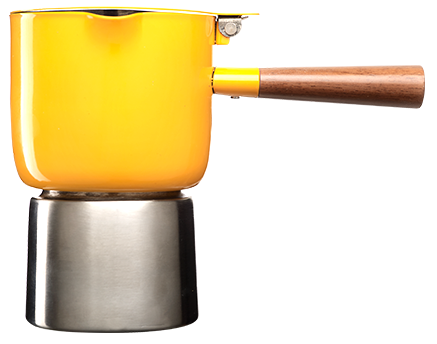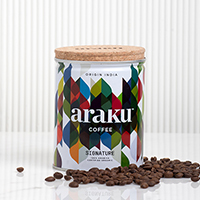GET 20% OFF
By subscribing to our newsletter
How coffee revived Araku Valley and its local farmers
For the world, Araku is an award-winning brand of gourmet coffee. But at our home ground in the Araku Valley, we are spearheading a narrative for our local community’s socio-economic development. Araku Coffee was born out of the need for transforming the lives of an entire tribal community. For our local farmers, Araku holds the dream of a better future. With Araku, we aimed to not just elevate them into entrepreneurs and coffee estate owners but to also share their empowerment stories around the world (‘vocal about local’ done right!).
More than 90% of the farmers who have been working with us for over 5 years are now out of poverty. Today, our farmers invest in the education of their children, decent healthcare, and precious metals. This has been possible because each of them earns full profits through a unique value chain and the complete absence of middlemen.
Due to Araku’s niche initiatives, the region’s economy, harmony, and environment have improved. The story of a world-class coffee brand started its humble beginnings when Araku Valley’s marginalized tribes took charge of their future. It’s a journey worth knowing and sharing (preferably while sipping a perfectly brewed cuppa).
WHERE DID IT ALL BEGIN?
Araku Coffee is a legacy project of Naandi Foundation, a non-profit organization that first arrived in the Araku Valley in 2000. At that time, the region’s literacy rate was low, while the rate for infant and maternal mortality was quite high. For quite a few decades, the economy here had relied on barter trade and the tribals had no cash to meet expenses such as healthcare & education.
Before India became independent, the British had managed to set up the first coffee plantations in Araku back in the 1900s. However, after independence, the coffee-growing decreased rapidly. The local community, despite having access to the perfect land and resources to grow coffee, wasn’t incentivized enough to commit to it. Araku Valley is a completely notified area––it has no private property and only has tribal access. Absence of proper training and no industrial support would only yield low-grade cherries and coffee beans for the tribal farmers. Moreover, the lack of buyers and low prices for their yield in the local market would not serve any purpose. Coffee cherries take 4 years to mature and its plants need a lot of care and attention. The poor tribals were unwilling to invest time and energy into tending coffee farms for years with little to no returns.
START OF SOMETHING NEW
After working on improving maternal mortality & education, Naandi Foundation turned its efforts towards addressing the next big problem that plagued the region - the lack of sustainable livelihoods.
The Adivasi farmers already had access to lands and the perfect environment to grow coffee plants. In 2004, Araku started with 1,000 families and 1,000 acres of land dedicated to coffee farming.
These farmers were taught the best practices of growing coffee plants by a global team of experts headed by Naandi’s Chief Agriculture Advisor, David Hogg. The farmers were also provided with organic manure mixed with bio-active ingredients for free, which enabled the plants to flourish and reduced costs for the Adivasis. The prices for the coffee were fixed before each season, and the farmers were always paid their wages upfront. This allowed them to plan their spendings and avoid borrowing money from middle-men or loan sharks. After seeing our farmers do better in life, more people in the local community wanted to grow Araku coffee.
By 2007, the Araku Organic Coffee Project formed SAMTFMACS– Small and Marginal Tribal Farmers Mutually Aided Cooperative Society. With 11,000 tribal farmers onboard, it became one of the largest fair trade and organic coffee cooperatives in the world. In the same year, a central processing unit was set up. This allowed Araku to have better control over the entire processing. All of these assets belong to the cooperative and the decisions are taken by the board, whose members are nominated and elected from the farmer communities. The cooperative gives its members the freedom to farm independently while benefiting from the association for resources and commercial activities.
Inspired by the story of Araku, coffee experts from India and abroad came to help out. They consulted extensively on growing the best cherries to create the finest coffee there is––Speciality coffee. Today, our farmers follow the best practices of regenerative agriculture. This ensures that a symbiotic ecosystem is maintained. Every farm’s soil is enriched with organic compost and a variety of trees are planted to provide different levels of shade to the coffee plants. Fruits such as mango and jackfruits are also grown. This helps in maintaining the diversity of the land, acts as a food resource for the farmer’s family, and can also be sold for extra income.
We’ve also collaborated with several organizations to help restore the forest in the area. Together, we’ve planted 23.5 million trees of 19 different varieties across the valley. Over 34000 acres of forest-land has been restored so far. This has also helped the local community mitigate the current and future adverse effects of climate change.
-
Araku brand, owned by the Adivasi cooperative, has put the entire Araku Valley on the global map. The coffee cherries plucked by farmers in this tiny region of Andhra Pradesh, India can now be bought worldwide as Speciality coffee beans. This small but mighty Adivasi-grown local business has even won international awards and is loved by professional cuppers. But most importantly, it has made its farmer families self-sufficient and proud.
It is a unique journey about going ‘global with local’, right?
Taste award-winning coffee and breath in the aroma of the Araku Valley, all at the same time. You can safely order your coffee beans from us here.


